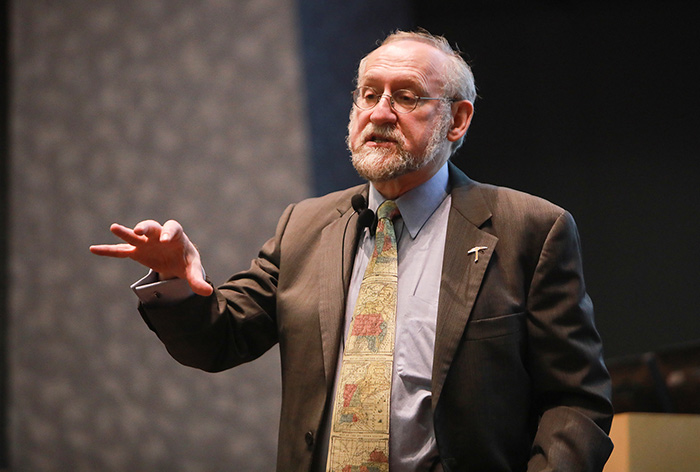Gratz College President Opens 2019 Centennial Lecture Series With Argument Against Electoral College
Last Updated on September 18, 2019 at 12:00 AM
Originally published September 18, 2019
By Victor R. Martinez
UTEP Communications
Paul Finkelman, Ph.D., presented an argument to abolish the Electoral College during the first Centennial Lecture address of the fall 2019 semester at The University of Texas at El Paso.

Finkelman, the president of Gratz College in Philadelphia, delivered his remarks Monday, Sept. 16, 2019, in front of a large crowd at the Undergraduate Learning Center.
“The Electoral College undermines democracy and undermines the legitimacy of the president because the president, currently and in the past, does not always represent the majority of the people,” Finkelman said. “You can’t run a democracy if you don’t have the support of the people. It is the only elected office in the country that the person with the most votes does not win.”
Finkelman said the solution is the National Popular Vote Interstate Compact, an agreement among a group of U.S. states and the District of Columbia to award all their electoral votes to the presidential candidate that wins the overall popular vote.
“There is a way out of this, which is for the states to adapt the National Popular Vote bill and then we can get rid of the Electoral College indirectly because the person with the most popular votes will win,” he said. “This would make America more democratic.”
UTEP’s Centennial Lecture Series invites noteworthy speakers to the UTEP campus to share their perspectives on a range of issues that are likely to impact our society, culture and lives.
“It’s an important role that UTEP plays in the community to bring in people from all over the world and all over the country to talk about issues of importance from a variety of perspectives,” said UTEP President Heather Wilson. “We are looking forward to several more Centennial Lectures that will bring people on to campus and allow them to listen to people with different views and to think about issues that are important to them.”
The Electoral College consists of 538 electors. A U.S. presidential candidate must collect 270 electoral votes to be elected. A state’s allotment of electors is equal to the number of members in its Congressional delegation — one for each member in the House of Representatives plus two for a state’s senators.
The National Popular Vote Interstate Compact would pool the electoral votes from among participating states. Once the 270-vote threshold has been reached between those participating states, they would award all of those votes to the candidate that wins the popular vote throughout all 50 states and the District of Columbia.
“At that point, the Electoral College is an artifact of the past, it does not matter because the electoral vote will go to the person with the popular vote,” Finkelman said. “That is what we have to strive for and it has to be state by state, state legislature by state legislature.”
He said the National Popular Vote will benefit all Americans in every state.
“It is a fallacy to believe that the small states would be ignored,” Finkelman said. “On the contrary, they would be more likely to be involved because you would want every vote you could get. If you move to a popular vote you will get greater voter participation. You would get more people involved and there would be more campaigning everywhere because every vote would count.”
The National Popular Vote bill is currently adopted in 14 states, Finkelman said.
“And by the way, it’s not partisan,” he said. “Next time it might be a Democrat who losses the popular vote and wins the electoral vote and suddenly Republicans will be screaming that the Electoral College is wrong. The idea that the popular vote wins has been the rule of law, except in the presidential election, for the entire history of the country. It’s not about which party wins, it’s about if the people win. People should get the candidate they voted for.”